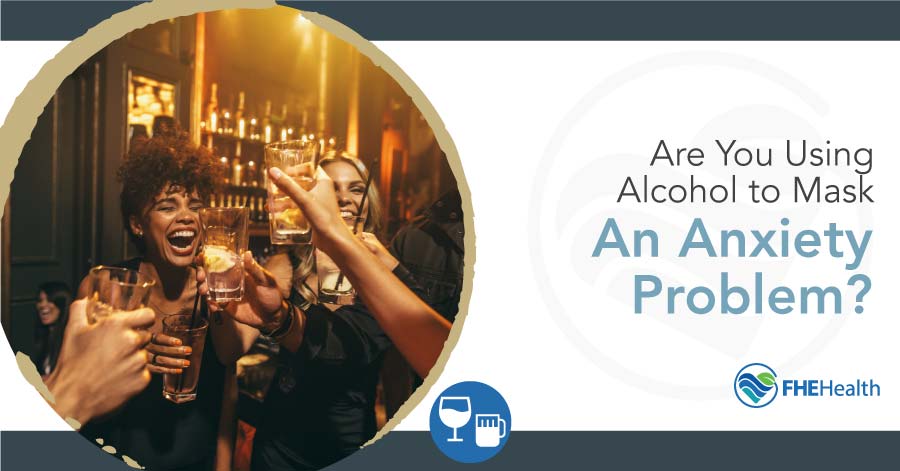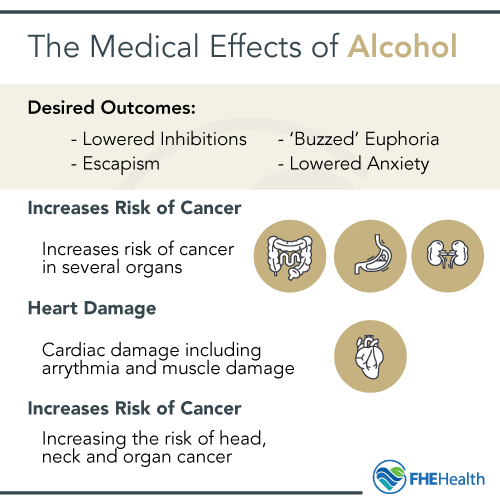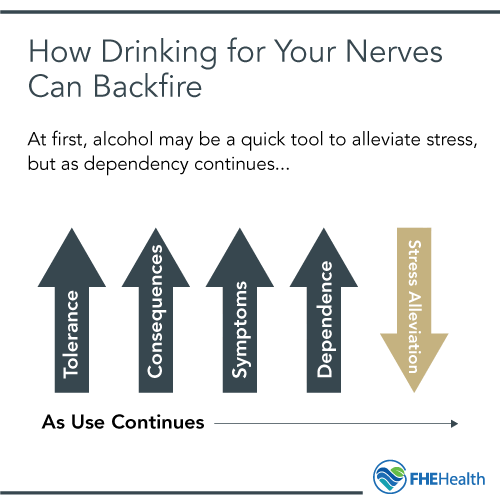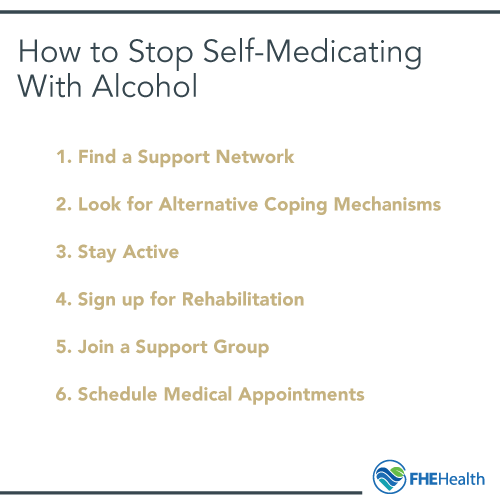
Alcohol has long been hailed for its ability to soothe the nerves. It acts as a sedative that affects the central nervous system, making the individual feel more relaxed and able to deal with stress. For that reason, it tends to be a popular go-to beverage during uncomfortable situations or stressful times, particularly for those living with conditions like anxiety or depression. However, while alcohol may seem beneficial for calming nerves, drinking can mask mental illness, and when done frequently, it can result in addiction.
Using Alcohol To Cope With Anxiety
For many people, drinking alcohol is a quick, easy way to deal with feelings of anxiety. Often referred to as liquid courage, alcohol can help an individual feel as though they fit in when they’re in uncomfortable situations, make it easy to be outgoing, and help eliminate worries temporarily. It numbs the senses enough to prevent someone from feeling natural fear, which makes it easy for them to go against their normal instincts. It also has a sedative effect, which is why so many use it to unwind at the end of a long workday.
According to the Anxiety and Depression Association of America, nearly one in five Americans are living with an anxiety disorder, and about 7 percent of the population has a social anxiety disorder. Unfortunately, less than half of those people ever receive professional treatment. Everyone else has to go it alone to figure out how to manage their symptoms, and for many, alcohol is an accessible coping tool. Alcohol is so common among those with anxiety that the National Institute on Alcohol Abuse and Alcoholism found that the number of people who have an anxiety disorder along with a substance use disorder is greater than the number of people who only have an anxiety disorder.
Unfortunately, using alcohol to address anxiety and get a boost in social situations generally leads to even bigger problems. In fact, in some instances, drinking alcohol can actually worsen the symptoms of mental health disorders such as anxiety. Alcohol withdrawal causes symptoms like increased blood pressure, increased heart rate, agitation, and anxiety. In those who are living with an anxiety disorder, these additional symptoms can make their initial disorder an even bigger challenge to manage. These symptoms can set in within just a few hours of consuming even moderate amounts of alcohol and last well into the next day.
For those living with anxiety, alcohol may seem like a simple, prescription-free option for calming the nerves and coping with uncomfortable feelings. However, it can worsen anxiety symptoms, which may lead to a cycle of heavy drinking and ultimately to alcohol addiction.
Treatment can begin quickly and discreetly, get started now If someone drinks too much, either on a single occasion or over time, they can suffer from serious health issues. According to the National Institute on Alcohol Abuse and Alcoholism, alcohol interferes with brain function. The disruptions in brain waves can make it difficult to think clearly and move with coordination. Excessive alcohol use destroys the heart, often causing problems like cardiomyopathy, or the stretching of the heart muscle. It can lead to arrhythmias, stroke, and high blood pressure. Frequent heavy drinking can lead to liver inflammation and health risks like fatty liver disease, alcoholic hepatitis, fibrosis, and cirrhosis of the liver. In the pancreas, drinking can lead to pancreatitis, which interferes with proper digestion. Studies have shown a direct relation between drinking and several types of cancer, including head and neck cancer, esophageal cancer, liver cancer, breast cancer, and colorectal cancer. Also, drinking can weaken the immune system and put the individual at greater risk for diseases like pneumonia and tuberculosis. Gamma-aminobutyric acid is another inhibitory neurotransmitter in the brain that delivers a relaxing effect on the nerves. It helps an individual with impulse control, appetite, sleep, and pain relief and helps create a positive mood. Alcohol helps stimulate the activity of GABA to deliver a sedative effect. In smaller amounts, alcohol can have a relaxing effect, but in higher doses, it may result in slurred speech, poor judgment, slow reflexes, and a staggering gait. Drinking alcohol may seem like a good way to alleviate stress, but it eventually causes more harm than good. When someone first starts drinking, alcohol reduces stress and takes their mind off their troubles. However, when they start drinking regularly, the body develops a tolerance, which can make anxiety and stress even more difficult to cope with. Eventually, they may have to consume alcohol more frequently to obtain the same results, leading to addiction. Serotonin is a chemical and neurotransmitter that helps regulate mood and social behaviors, appetite, digestion, sleep, memory, temperature regulation, and sexual desire. It also affects the cardiovascular system, muscles, and endocrine system. Although it is manufactured in the brain, the majority of serotonin is found in the digestive tract and blood platelets. There are approximately 40 million brain cells that are affected both directly and indirectly by serotonin. Low levels of serotonin have been directly linked to depression, obsessive-compulsive disorder, anxiety, panic disorders, and anger. Because alcohol alters the serotonin levels and other neurotransmitters in the brain, drinking may actually worsen anxiety over time. Alcohol also disrupts normal sleep patterns, causing the individual to spend less time in each stage of sleep. This can cause the individual to feel sluggish and tired the next day and less able to handle stress in a healthy way. The sleep-deprived brain is less adept at shutting down during an anxiety attack or when negative thoughts move in. The average social drinker has a few drinks and may experience a loss of control, while the chronic drinker consumes a few drinks, feels a false sense of control, and continues drinking. Anxiety and alcohol abuse are often connected. People drink to relax, and chronic drinking causes anxiety. According to the Anxiety and Depression Association of America, 20 percent of people with social anxiety suffer from some type of alcohol dependence or frequently abuse alcohol. However, anxiety, social or generalized, isn’t the only mental health disorder that is commonly self-treated with alcohol. Many who live with other types of mental illnesses turn to alcohol as a way of dealing with disruptive and unpleasant thoughts, emotions, and compulsions. Bipolar disorder and alcohol use disorder often go hand-in-hand, and while their connection isn’t well-understood, several factors probably come into play. During the upswing from depression, the individual often experiences euphoria. This can result in bad judgment and lowered inhibitions, which can lead to increased drug or alcohol use. Some research indicates that genetics might also have a role. The same traits that affect brain chemistry linked to bipolar disorder may also affect the way the brain responds to alcohol, increasing the risk of addiction. For someone with schizophrenia, alcohol can provide a much-needed break from the mental overstimulation that accompanies this disorder by dulling their senses and making them less aware of what they’re experiencing. However, its effects go even beyond that. Research indicates that alcohol has a greater euphoric effect on those with schizophrenia compared to someone without the disorder. Because their brains give them an even bigger reward when they drink, someone with schizophrenia is at a greater risk for developing an alcohol use disorder. Unfortunately, with that bigger “reward” comes more uncomfortable withdrawal symptoms, including more intense hallucinations. Depression is a serious mental illness that can affect virtually every area of a person’s life, from their performance at school or on the job to their relationships with friends and family. Those with depression are also more prone to high-risk behaviors, including disordered eating, drug use, and alcohol use. Because alcohol is a sedative and a depressant, it’s not surprising that it generally intensifies the symptoms of depression. Personality disorders affect an individual’s behavior, mood, and the way they function in everyday life. They come with a lot of emotional and behavioral challenges that can make a person more likely to turn to alcohol for relief. Many characteristics that accompany personality disorders—such as impulsiveness, very high or very low self-esteem, and difficulty managing emotions— are associated with an increased likelihood of alcohol addiction. According to a recent study, those with personality disorders are five times more likely to develop an alcohol use disorder. While having a mental illness doesn’t always lead to alcoholism and alcoholism doesn’t always lead to mental illness, excessive alcohol consumption can significantly increase the likelihood of a dual diagnosis in the future. While not everyone who uses alcohol has an anxiety disorder, there are many cases in which alcohol use masks anxiety. This may prevent the individual or those close to them from recognizing that a problem exists, delaying the opportunity for seeking treatment. In some cases, once the anxiety disorder is treated, the substance abuse dries up. Alcohol replaces the brain’s need to learn to cope with stress on its own, so quitting alcohol can also cause anxiety. As a result, many people tend to continue drinking. Alcohol’s effects last long after the withdrawal symptoms, which is why many alcoholics do best in treatment recovery situations. There are many strategies alcoholics can use to deal with anxiety and depression the correct way and overcome the addiction. If you or someone you love needs more information on substance abuse recovery, contact one of our caring counselors at FHE Health at (833) 795-0119. Our team members are on hand 24 hours a day, seven days a week to answer any questions you have about treatment and recovery.Need Help?
Medical Effects of Alcohol

Why Is it Called the Nerve Calmer?
Dangers of Self-Medicating Anxiety with Alcohol
Why Drinking to Calm Your Nerves May Make Things Worse

The Link Between Mental Health Disorders and Alcoholism
Bipolar Disorder and Alcohol
Schizophrenia and Alcohol
Depression and Alcohol
Personality Disorders and Alcohol
A Hidden Anxiety Disorder
How You Can Stop Using Alcohol for Anxiety

About Brett Friedman
With an insistence on only the highest standards in policy compliance and documentation, and a strong commitment to highly ethical business practices... read more









